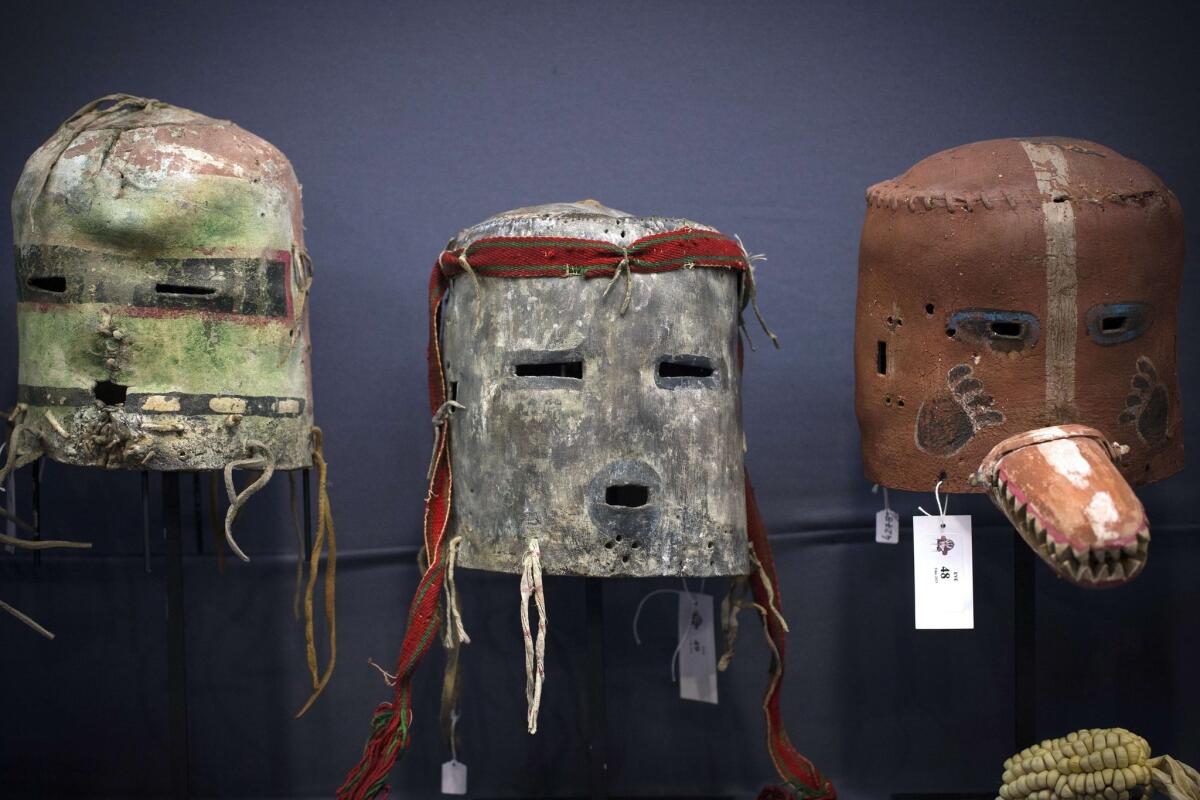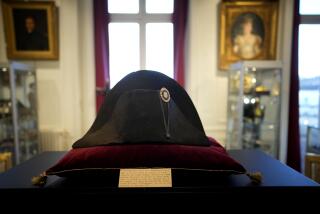Sacred Hopi tribal masks are again sold at auction in Paris

- Share via
Another group of sacred Hopi masks was gaveled away at a Paris auction Friday, over the objections of tribe members and the U.S. Embassy in Paris, Agence France Presse has reported.
In Hopi tradition, the masks don’t merely represent spirits, but embody them, making it a sacrilege to collect and display them, or otherwise use them outside the ceremonies for which they were made.
An appeal to a Paris court on Thursday failed, the news agency reported, and the Eve auction house went ahead with the sale, which also included Navajo artifacts. However, only nine of the 29 masks were sold, for an average price of about $20,800. A 19th century mask fetched the highest price, $51,000.
The auction was at least the third one in Paris in the last 15 months to have taken place over U.S. and Native American objections.
In trying to stop the sale, the U.S. Embassy told French authorities that tribal representatives should be allowed to inspect the objects being sold, for evidence that they may have been taken without the tribes’ authorization and therefore subject to restitution proceedings.
“The sale of a sacred object cannot be dismissed with a wave of a hand as a mere commercial transaction,” the embassy said, according to the news report. The auction house responded that “no American law has been violated.”
In fact, there is no U.S. law against sacred Native American art and artifacts being collected or sold by private owners. The 1990 Native American Graves and Repatriation Act restricts what institutions receiving federal funding can acquire or display, but it doesn’t apply to private collectors.
W. Richard West Jr., president of L.A.’s Autry National Center of the American West, and a member of the Cheyenne tribe, has noted that the law has had some persuasive force in the private sphere, making auction houses such as Sotheby’s and Christie’s “somewhat more sensitive and diplomatic” about selling sacred objects.
In April, 2013, the Néret-Minet Tessier & Sarrou auction house in Paris generated $1.2 million as 70 Hopi masks went for an average of $17,143, with a Mother Crow mask created around 1880 fetching $209,000. When Drouot auctioneers proceeded with a sale last December, the L.A.-based Annenberg Foundation phoned in anonymous bids, landing 21 Hopi masks and three sacred Apache headdresses for $530,000, in order to return them to the tribes.
Survival International, which advocates for the rights of tribal peoples around the world, has entered objections to the auctions. Did the fact that fewer than a third of the masks were sold in Friday’s auction indicate that the message is getting through to would-be collectors?
“We certainly hope that’s the case,” said Kayla Wieche, spokeswoman for the organization’s U.S. office in San Francisco. “It would be great for people to realize this sort of thing is unethical.”
The Washington, D.C.-based Holocaust Art Restitution Project, devoted to securing the return of art looted by the Nazis, issued a statement Friday saying it was outraged by the most recent Paris auction of Native American artifacts, and that French authorities’ decision allowing it to go forward was “both tragic and shameful.”
Ori Z. Soltes, the group’s chairman, said he had urged France’s Conseil des Ventes (Board of Sales) to use its regulatory power to suspend the auction, but that instead it had issued a ruling saying that no Native American tribe has a legal standing to pursue cultural claims in France.
Soltes said the decision flies in the face of the French government’s endorsement of the 2007 United Nations Declaration on the Rights of Indigenous Peoples.
The declaration affirms that “states shall provide redress through effective mechanisms…developed in conjunction with indigenous peoples,” to secure restitution of “cultural, intellectual, religious and spiritual property taken without their free, prior and informed consent or in violation of their laws, traditions and customs.”
Follow https://twitter.com/boehmm of the LA Times for arts news and features
More to Read
The biggest entertainment stories
Get our big stories about Hollywood, film, television, music, arts, culture and more right in your inbox as soon as they publish.
You may occasionally receive promotional content from the Los Angeles Times.











